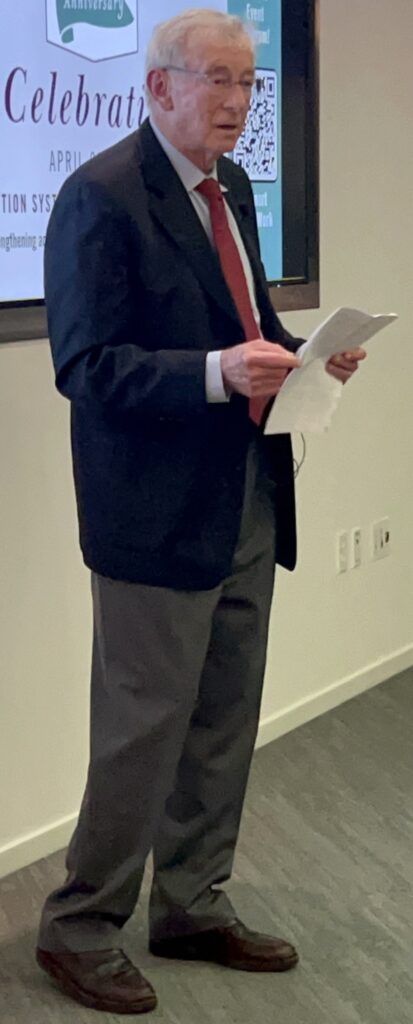Since spring of 2025, RSI’s Kane County Eviction Mediation Program has benefited from the support of Illinois JusticeCorps to help it run smoothly: Illinois JusticeCorps fellow Sophie Rexrode has worked alongside RSI in the courthouse, providing parties information about the eviction court process, mediation and rental assistance. Sophie was kind enough to sit down recently and answer a few questions for us about her work. We’re so grateful to Sophie for all she does to help the program serve the Kane County community! Please note that the views expressed below do not represent those of Illinois JusticeCorps, AmeriCorps or the Kane County Law Library.
Can you tell us a bit about the Illinois JusticeCorps program? When did you join?
I joined Illinois JusticeCorps in the fall of 2024, because I knew I was interested in (and frustrated with!) the legal system and wanted to devote time to serving people impacted by it.
Illinois JusticeCorps is an AmeriCorps program that places volunteers in courthouses across the state to help people who don’t have lawyers navigate the legal system. We field all kinds of questions, from “Where is the courtroom?” to “How do I file an employment discrimination complaint?” to “I was just served with divorce papers, and I don’t know what that means or how to proceed.”
JusticeCorps members aren’t lawyers, and we can’t give legal advice, but we can provide legal information like forms and guides, and explain how court processes work. The court system is incredibly stressful and confusing, so we’re here to listen, share resources and hopefully make people’s experiences a little bit easier.
What led you to join Illinois JusticeCorps, and how did you get connected with RSI?
I’d always been interested in law, but I didn’t have any background in it before joining Illinois JusticeCorps — I studied cognitive science and theater in college. But in my time as a JusticeCorps member I expressed a strong interest in housing and eviction issues, so when my supervisor, Hallē Eichert (the Director of the Law Library), heard that there was a need for help with Court-Based Rental Assistance Program (CBRAP) applications, she put me in contact with (RSI Eviction Mediation Program Manager) Christina Wright and RSI.
What does your JusticeCorps work at eviction court entail?
I’ve been assisting with CBRAP applications and tabling with RSI outside eviction court since spring 2025. I table with (RSI Eviction Mediation Program Assistant) Cathy McCoy each week to provide information on the court process, mediation and rental assistance.
Much of my work is helping tenants fill out the rental assistance application. You can only apply for CBRAP on a website, so if people want to apply but don’t have access to/aren’t comfortable with computers, I’ll help them through the process of scanning and uploading documents. Because transportation poses a hardship for many tenants in eviction proceedings, I travel all over the county to meet people at public libraries near where they live and help them in person.
Outside of evictions, most of my work is at the Kane County Law Library & Self Help Legal Center in St. Charles, where I work alongside the fantastic staff there to provide legal navigation. I also assist with the Lawyer in the Library programs (bringing free legal advice to local public libraries) and help to redesign signage and resources to make court processes easier to understand.
How many hours a week do you generally spend on JusticeCorps work?
It really depends on how many people I’m working with! I’d estimate I spend anywhere from 2–8 hours per week, including time at eviction court and helping people with applications. I know I’ve volunteered over 95 hours in the time I’ve been doing this.
Do you live in Kane County?
I do! I’m originally from the East Coast but moved here to work with Illinois JusticeCorps. I’ve really enjoyed getting to know the community here and exploring up and down the river and through all the parks!
What is your favorite part about your Illinois JusticeCorps work?
My favorite part about tabling and assisting with CBRAP is the people. The meetings I have with tenants can be stressful and difficult, but they are also full of real connection and (surprisingly) laughter. Even while navigating one of the hardest things in life, the tenants are kind, generous, and funny. It’s a privilege to get to work with them.
What do you find challenging about your work with the eviction mediation program?
I find the limitations on resources available and the services we can provide to be frustrating at times. It’s wonderful that mediation exists as an opportunity, but it can still be an inequitable arena for tenants going up against their landlord’s attorney without any representation, especially for those who aren’t comfortable with computers or have other accessibility or access needs. Similarly, while the CBRAP program is fantastic, far too many people still fall through eligibility gaps and are blocked by procedural obstacles.
Do you have future career plans/goals that relate to this work?
Yes! I’m currently starting the law school application process, with the hopes of pursuing legal aid work specifically around housing and evictions.
Do you do other volunteer work?
I volunteer lots of places! Some of my volunteering relates directly to housing: I take shifts at the Aurora Overnight Warming Shelter and help build houses with Habitat for Humanity. I’ve also done volunteering with local forest preserves, local food pantries/banks and community fridges, and as a “snow angel” (shoveling driveways for neighbors).
Working in an environment where eviction is on the table can be stressful. What do you like to do for fun/to relieve stress?
I love trail running, and try to get outside whenever possible. I doodle in the margins of notebooks and like to write letters to friends and family.
How do you think the Kane County Eviction Mediation Program is important to the community it serves?
I think building out parallel and alternative ways of resolving issues is tremendously important if we are interested in having a justice system that works for everyone, and the eviction mediation program is a significant step in that direction. I also think that opening doors for dialogue in the community is critical, and the benefits from that ripple outward even if an individual case doesn’t get resolved.
Is there anything else you’d like to talk about that might be interesting/relevant to RSI’s readers?
I just want to emphasize how serious evictions are, and the gap that exists in legal services for low-income people. 96% of tenants don’t have lawyers but are stuck navigating a process that was built by and for attorneys. Almost all landlords are represented by attorneys, many of whom specialize in evicting tenants. Court processes are challenging at the best of times, but they become impossibly confusing in the chaos that ensues when someone is threatened with being removed from their home. Evictions are catastrophically destabilizing events, jeopardizing tenants’ jobs, families, communities, and health, yet there are few support systems for people thrown into this process. Against this backdrop, I am grateful to be able to provide the small assistance I can to tenants, but there is such a tremendous need.



